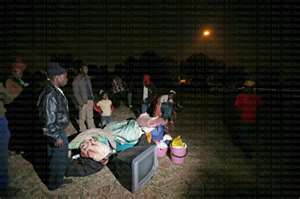In greeting to several concerns from a ubiquitous public, supervision skeleton to impulse a whip on bootleg entrants by deporting them while relocating all bonafide refugees to Dzaleka Refugee Camp by Jun 2013.
But a eminent tellurian rights defender has warned supervision to step delicately on a emanate observant procedures contingency be followed.
Although Malawi supervision is a signatory to several general conventions on a rights of refugees and immigrants including United Nations’ ‘Convention and Protocol Relating to a Status of Refugees’ a nation still rounds adult immigrants and deports them after prosecution.
However Home Affairs apportion Uladi Mussa told Malawi News on Thursday that supervision will no longer concede people from other countries to enter a nation anyhow.
“We have bonafide refugees who have been screened by a United Nations High Commission for Refugees (UNHCR) and a rest are bootleg immigrants. As such by Jun subsequent year, we will have brought reason by promulgation behind all non-deserving immigrants some of whom wars ceased in their countries. Why should we continue harbouring them?” pronounced Mussa.
“Currently we are operative together with UNHCR to find a improved approach of dealing with a interloper question. Some of these people are no longer refugees hence we should not keep them. We had Mozambicans in a past, after a fight they returned home. Why these others are not returning home that we do not know,” he added.
Answering an emailed questionnaire, Associate Field Officer obliged for UNHCR Gavin Lim pronounced there is a reduction of foreigners who find haven in a country.
“Only a tiny series of migrants from a Horn of Africa explain haven in a country. Whether or not those do validate for haven depends on circumstances of their particular and where they are entrance from. Clearly Somalia is in a midst of fight where in Ethiopia there are some convincing claims of domestic oppression and tellurian rights abuse,” pronounced Lim.
Lim stressed that supervision of Malawi has obligations to perform overdue to commitments that it has done in general protocols.
“As signatory to applicable interloper to conventions, Malawi has an requirement to concede those journey fight or harm to enter and sojourn on a domain according to element of non-refoulement, to that states have a avocation not to ban or lapse refugees to a domain where their lives would be threatened,” he added.
When acted with a doubt that if Dzaleka has adequate ability to accommodate all a refugees, Mussa said, “that’s because we wish to send those who are not bonafide behind home so that we can emanate space for usually those who are deserving.”
Institute for Policy Interaction (IPI) Executive Director Rafik Hajat however stressed a need for supervision to follow existent protocols when perplexing to understanding with a problem of bootleg immigration.
“Sometimes this emanate becomes wily generally when it comes to a vetting routine as some of these competence be domestic or mercantile refugees while others competence be insurgents that send jitters to hosting nations,” pronounced Hajat, “the doubt should be either procedures are being followed when traffic with this problem. Government should not act arbitrarily on this emanate as these people’s rights are enshrined in UN interloper charters.
Lim yet conceded a hazard that a interloper problem causes when it comes to corroboration of particular status.
“At a moment, we can’t contend all migrants from a Horn of Africa are bonafide refugees, though some of them will be and need insurance underneath general law. The supervision of and churned roving flows is essentially a matter for government. In UNHCR’s view, informal partnership is essential as this emanate is not inspiring Malawians alone,” he said.
The developments are entrance hardly weeks after 48 immigrants reportedly mislaid their lives on Lake Malawi when a H2O vessel they were regulating to cross¬over into a nation capsized.
Both Home Affairs method and UNHCR determine that refugees are confronting a substantial risk.




